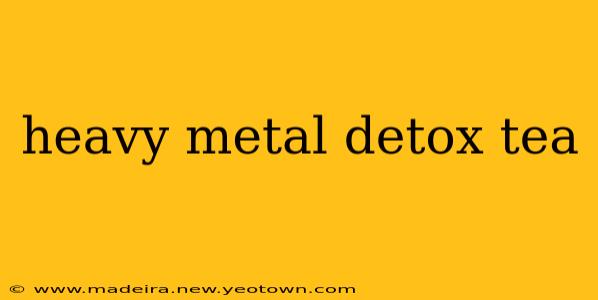The idea of sipping a tea to rid your body of heavy metals sounds almost too good to be true, right? It's a tempting image – a soothing cuppa cleansing your system of insidious toxins. But does the reality match the allure? Let's unravel the truth behind heavy metal detox teas and explore the science, the claims, and the potential pitfalls.
My journey into this topic began with a simple Google search, fueled by a friend's fervent belief in the power of detox teas. What I discovered was a landscape of conflicting information, ranging from enthusiastic testimonials to cautious warnings from medical professionals. This exploration led me to delve deeper into the complexities of heavy metal detoxification and the role – or lack thereof – that tea plays in the process.
What are Heavy Metals, and Why are They a Concern?
Before we dive into the tea, let's understand the enemy. Heavy metals are elements with high density that can be toxic to humans, even in small amounts. Examples include lead, mercury, arsenic, and cadmium. These metals can enter our bodies through various routes: contaminated food and water, industrial pollution, and even certain medical treatments. Accumulation of heavy metals in the body can lead to a range of health problems, from neurological damage to kidney dysfunction.
Can Heavy Metal Detox Tea Actually Remove Heavy Metals?
This is the million-dollar question, and the answer, unfortunately, is nuanced. Many teas marketed as "heavy metal detox" teas often contain ingredients believed to have chelating properties. Chelation is a process where a molecule binds to a metal ion, making it easier for the body to excrete. However, the effectiveness of these teas in removing heavy metals is largely unproven by robust scientific studies. While some individual components might exhibit chelating properties in a lab setting, their concentration in tea, and the body's ability to absorb and utilize them effectively for heavy metal chelation, remains questionable.
What are the ingredients in heavy metal detox teas?
Many commercially available detox teas boast a blend of herbs and ingredients like cilantro, chlorella, and barley grass. These are often touted for their purported detoxification properties. While some research suggests potential benefits of these ingredients in supporting liver and kidney function (organs vital in natural detoxification processes), there's little concrete evidence to support their direct role in removing significant amounts of heavy metals from the body.
Are there any side effects associated with heavy metal detox teas?
While generally considered safe for consumption in moderate amounts, the potential side effects of heavy metal detox teas warrant consideration. Some individuals might experience mild gastrointestinal discomfort like diarrhea or nausea. Furthermore, the lack of regulation in the supplement industry means the quality and purity of these teas can vary significantly. This raises concerns about potential contamination with heavy metals or other harmful substances.
How are heavy metals actually removed from the body?
The body has natural mechanisms for eliminating heavy metals, primarily through the liver and kidneys. However, in cases of significant heavy metal exposure, medical intervention is often necessary. Chelation therapy, administered under strict medical supervision, is the most effective method for removing heavy metals from the body. This usually involves intravenous administration of chelating agents. Never attempt self-treatment for heavy metal poisoning.
What are the best ways to reduce heavy metal exposure?
The best approach to heavy metal detoxification is prevention. This involves minimizing exposure through:
- Consuming a balanced diet rich in fruits, vegetables, and whole grains.
- Drinking clean, filtered water.
- Avoiding exposure to industrial pollutants.
- Following proper safety guidelines when handling potentially hazardous materials.
Is it safe to use heavy metal detox teas alongside conventional medical treatments?
It’s crucial to consult your doctor before using any heavy metal detox tea, especially if you are undergoing medical treatment for heavy metal poisoning or any other health condition. Many detox teas interact with medications, potentially hindering their effectiveness or causing adverse reactions.
In conclusion, while the idea of a simple tea solution for heavy metal detoxification is appealing, the scientific evidence supporting its effectiveness remains limited. Heavy metal poisoning is a serious issue requiring professional medical attention. Prevention and a healthy lifestyle are your best defenses against heavy metal accumulation. Consult a healthcare professional before embarking on any detoxification regimen.

